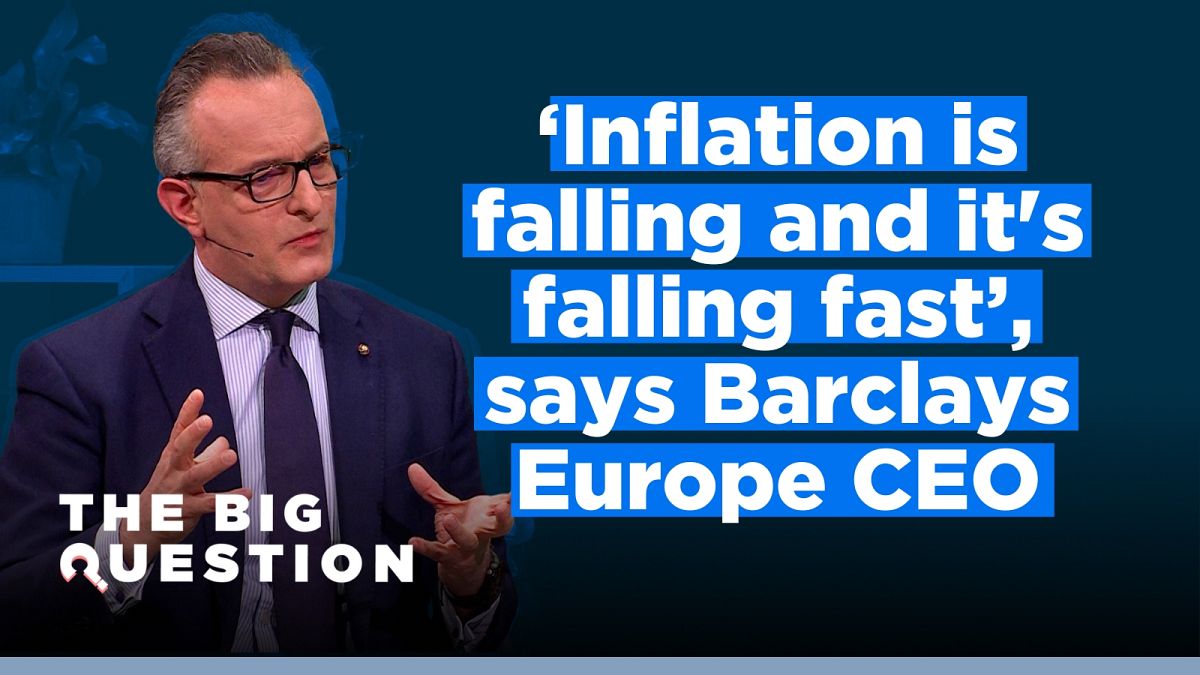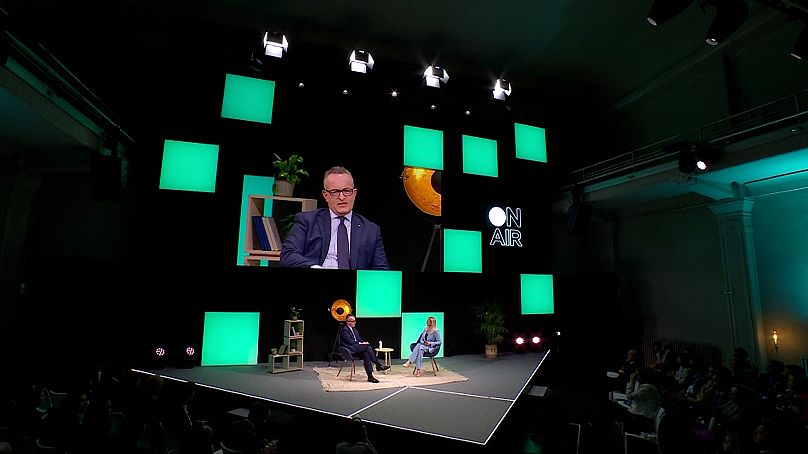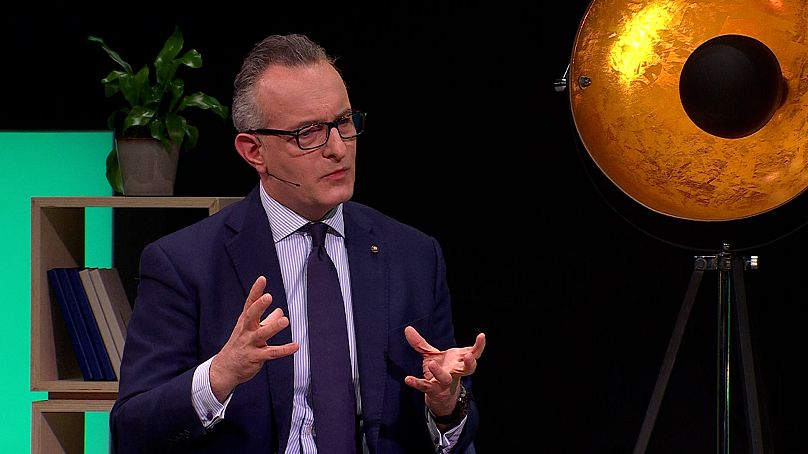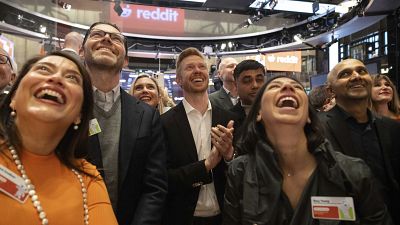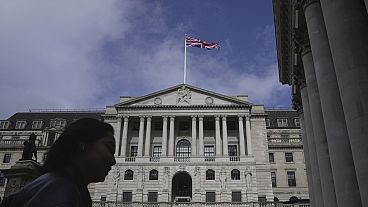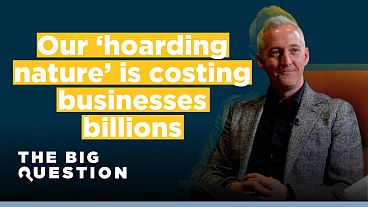Francesco Ceccato, the Chief Executive Officer at Barclays Europe, discusses when he thinks the ECB may begin cutting interest rates - and how the forthcoming elections may impact the markets.
Francesco Ceccato, the CEO of Barclays Europe, believes Europe's economy is at a turning point and set out during a live recording of The Big Question in Brussels on Wednesday when he expects the European Central Bank (ECB) to start its rate cutting cycle - and where the deposit rate might go.
"The monetary policy that we have seen impacting the European economy has had its effect and inflation is falling and it is falling fast. Now, you have the occasional blip in this or that particular element of data but the trend is very clear so that is one particular positive piece of news," Ceccato said.
"Wage growth has taken place and so there is clearly a lot more spending power, and a lot more disposable income in the European Union, and while the labour market has shown a little bit of slack, we haven't really seen labour shedding by firms and I think that is just some of the background why I'm feeling optimistic with this backdrop that there is an opportunity for the ECB to begin its cutting cycle. We expect that to begin in June, and likely to cut at every meeting up until January of 2025. So we expect the deposit rate to go from 4% today to about 2.5% then."
Ceccato further highlighted during the interview with Barnes his economic outlook for the year ahead.
"We are expecting perhaps the first half of this year to be still relatively stagnant, and the second half to see a growth incipient rebound."
How will the EU elections impact business in Europe?
Ceccato was also asked for his thoughts on how the elections taking place this year might impact the business landscape in Europe - with 76 elections taking place, resulting in around four billion people going to the polls.
"From my perspective, I see no real game changer on the horizon in terms of the political or fiscal integration of the union as a result of these elections."
Ceccato also noted how there can be market volatility around elections but said it was not necessarily a bad thing.
"Our markets business thrives on volatility. And so, if our markets business does well, then we can obviously support other businesses. So I think overall neutral to potentially positive."
Consolidating capital across member states
A task at hand for the EU is consolidating capital markets across member states to open up investment opportunities for citizens. Ceccato shared his view on how he thought it was going and what further progress needs to be made. He also highlighted which avenues EU funds should be directed towards.
"So I think the Capital Markets Union project, and in general focusing on the capital markets, has to be one of the top priorities for policy for the next parliament. That and competitiveness. And the two really go hand in hand. And why do I say that? Because companies have to have the oxygen of capital markets to invest in growth and innovation.
"And there is a point at which you run out of the ability to continue to fund growth and fund innovation if you are just looking at Founders Capital and bank finance. So being more deliberate about the Capital Markets Union is essential."
Improving financial literacy across Europe
The European Commission has been very articulate on its mission to improve financial literacy among Europeans and has published several frameworks to help develop national policies - a task that Ceccato says is integral.
"I think it's enormous. And the reason is we in Europe have roughly 34% of our household assets in deposits with banks. Harnessing even a small portion of that could be an enormous opportunity to drive growth and innovation. If we could channel even 5% of that, that could make, according to a study that I've read, a difference of just under two trillion to the productive capital that is deployed within the EU.
"So education is very important and it's pivotal because I think education helps people have the confidence to invest."
We asked our followers on social media about their thoughts on financial literacy in Europe. 68% of respondents said they felt insufficiently educated on the best way to invest their money.
Ceccato further noted that it also matters because of the changing demographic in Europe and the old-age dependency ratio.
"Right now, you have roughly three working age population per every one retired age person. And that is going to probably move to less than 2 to 1 by 2050. So it's really important to be not solely depending on the pay-as-you-go system but creating the opportunity for savings and ultimately securing the financial futures of people who are of a certain age."
How can we keep Europe competitive whilst achieving green targets?
Another task at hand for the EU is keeping Europe competitive while creating a net-zero green economy by 2050 with the EU Green Deal. We asked Ceccato for his thoughts on the massive US subsidies supporting green industry via the Inflation Reduction Act in the US.
"On the Green Deal versus the Inflation Reduction Act. I mean, what I would say is why not look at what features are potentially things that we can learn from, you know, there are different ways that the Inflation Reduction Act deals with incentives and incentives are output based as opposed to input based.
"We have demand and supply-side incentives in the US and only supply-side incentives in the EU. So these are things that we can look at to potentially see how we can become more competitive. But ultimately, back to the point I was making earlier, competition is also helped by the capital markets and the discipline that they provide," he said.
What are the challenge of divesting away from oil and gas?
Barclays recently announced earlier this year that it will no longer fund certain categories of new oil and gas fields. Ceccato shared his view on whether ESG concerns have fallen down the agenda.
"I don't think so at all, actually, I think for my clients and indeed for my colleagues it remains a hugely important topic and people understand that the energy transition is one of the key topics of our time and that it's going to take a lot of money obviously. I think the estimates are, from about €400 billion to 2030 for the EU to fund its energy transition, and then roughly, €550 billion per year until 2050.
"So these are huge amounts of money and those are clearly investments that cannot only be done by member states or by the national governments. We need the whole of the industry to buy into this transition. And that is what we see reflected in our clients," he added.
The Big Question is a series from Euronews Business where we sit down with industry leaders and experts to discuss some of the most important topics on today’s agenda.
Watch the video above to see the full episode with Francesco Ceccato.
